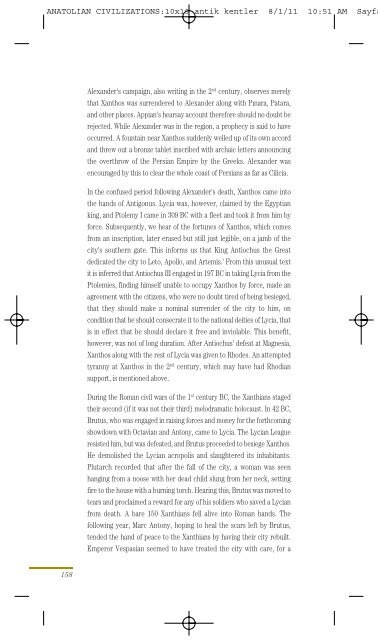Anatolian Civilizations and Historical Sites - TEDA
Anatolian Civilizations and Historical Sites - TEDA
Anatolian Civilizations and Historical Sites - TEDA
Create successful ePaper yourself
Turn your PDF publications into a flip-book with our unique Google optimized e-Paper software.
ANATOLIAN CIVILIZATIONS:10x19 antik kentler 8/1/11 10:51 AM Sayfa<br />
158<br />
Alex<strong>and</strong>er's campaign, also writing in the 2 nd century, observes merely<br />
that Xanthos was surrendered to Alex<strong>and</strong>er along with P›nara, Patara,<br />
<strong>and</strong> other places. Appian's hearsay account therefore should no doubt be<br />
rejected. While Alex<strong>and</strong>er was in the region, a prophecy is said to have<br />
occurred. A fountain near Xanthos suddenly welled up of its own accord<br />
<strong>and</strong> threw out a bronze tablet inscribed with archaic letters announcing<br />
the overthrow of the Persian Empire by the Greeks. Alex<strong>and</strong>er was<br />
encouraged by this to clear the whole coast of Persians as far as Cilicia.<br />
In the confused period following Alex<strong>and</strong>er's death, Xanthos came into<br />
the h<strong>and</strong>s of Antigonus. Lycia was, however, claimed by the Egyptian<br />
king, <strong>and</strong> Ptolemy I came in 309 BC with a fleet <strong>and</strong> took it from him by<br />
force. Subsequently, we hear of the fortunes of Xanthos, which comes<br />
from an inscription, later erased but still just legible, on a jamb of the<br />
city's southern gate. This informs us that King Antiochus the Great<br />
dedicated the city to Leto, Apollo, <strong>and</strong> Artemis.' From this unusual text<br />
it is inferred that Antiochus III engaged in 197 BC in taking Lycia from the<br />
Ptolemies, finding himself unable to occupy Xanthos by force, made an<br />
agreement with the citizens, who were no doubt tired of being besieged,<br />
that they should make a nominal surrender of the city to him, on<br />
condition that he should consecrate it to the national deities of Lycia, that<br />
is in effect that he should declare it free <strong>and</strong> inviolable. This benefit,<br />
however, was not of long duration. After Antiochus' defeat at Magnesia,<br />
Xanthos along with the rest of Lycia was given to Rhodes. An attempted<br />
tyranny at Xanthos in the 2 nd century, which may have had Rhodian<br />
support, is mentioned above.<br />
During the Roman civil wars of the 1 st century BC, the Xanthians staged<br />
their second (if it was not their third) melodramatic holocaust. In 42 BC,<br />
Brutus, who was engaged in raising forces <strong>and</strong> money for the forthcoming<br />
showdown with Octavian <strong>and</strong> Antony, came to Lycia. The Lycian League<br />
resisted him, but was defeated, <strong>and</strong> Brutus proceeded to besiege Xanthos.<br />
He demolished the Lycian acropolis <strong>and</strong> slaughtered its inhabitants.<br />
Plutarch recorded that after the fall of the city, a woman was seen<br />
hanging from a noose with her dead child slung from her neck, setting<br />
fire to the house with a burning torch. Hearing this, Brutus was moved to<br />
tears <strong>and</strong> proclaimed a reward for any of his soldiers who saved a Lycian<br />
from death. A bare 150 Xanthians fell alive into Roman h<strong>and</strong>s. The<br />
following year, Marc Antony, hoping to heal the scars left by Brutus,<br />
tended the h<strong>and</strong> of peace to the Xanthians by having their city rebuilt.<br />
Emperor Vespasian seemed to have treated the city with care, for a






